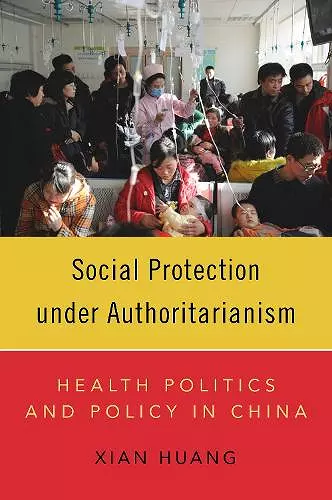Social Protection under Authoritarianism
Health Politics and Policy in China
Format:Hardback
Publisher:Oxford University Press Inc
Published:6th Oct '20
Currently unavailable, and unfortunately no date known when it will be back
This hardback is available in another edition too:
- Paperback£28.49(9780197642771)

Why would an authoritarian regime expand social welfare provision in the absence of democratization? Yet China, the world's largest and most powerful authoritarian state, has expanded its social health insurance system at an unprecedented rate, increasing enrollment from 20 percent of its population in 2000 to 95 percent in 2012. Significantly, people who were uninsured, such as peasants and the urban poor, are now covered, but their insurance is less comprehensive than that of China's elite. With the wellbeing of 1.4 billion people and the stability of the regime at stake, social health insurance is now a major political issue for Chinese leadership and ordinary citizens. In Social Protection under Authoritarianism, Xian Huang analyzes the transformation of China's social health insurance in the first decade of the 2000s, addressing its expansion and how it is distributed. Drawing from government documents, filed interviews, survey data, and government statistics, she reveals that Chinese leaders have a strategy of "stratified expansion," perpetuating a particularly privileged program for the elites while developing an essentially modest health provision for the masses. She contends that this strategy effectively balances between elites and masses to maximize the regime's prospects of stability. In China's multilevel governance, both centralized and decentralized structures are involved in the distribution of social health insurance. When local leaders implement the stratified expansion of social health insurance, they respond to varied local conditions. As a result, China's health insurance policies differ dramatically across subnational regions as well as socioeconomic groups. Providing an in-depth look into China's health insurance system, this book sheds light not only on Chinese politics, but also on how social benefits function in authoritarian regimes and decentralized multilevel governance settings.
This book is a fundamental resource for scholars and students who are interested in social policy and regime stability in China. * Kerry Ratigan, Journal of Chinese Political Science *
Huang's book contributes richly to the growing literature of welfare regimes under authoritarian rule. Providing a wealth of information on the expansion of social welfare in China, she traces how variation in fiscal constraints and social risks shape how local officials strategically implement national programs. The resultant subnational variation in health insurance programs produce distinct patterns of stratified social welfare systems, a dynamic that sheds light on welfare expansion in the absence of electoral accountability more generally * MelaniCammett, Clarence Dillon Professor of International Affairs, Harvard University *
Xian Huang has written a brilliant book on the policy and politics of health care in China. Her analysis powerfully combines quantitative and qualitative evidence and reveals the deep-rooted inequalities in access to and quality of health care enjoyed by different groups of Chinese citizens. The lessons are profound and sobering. * Qin Gao, Professor of Social Policy and Social Work; Director, China Center for Social Policy, Columbia University *
Huang's excellent book addresses three questions: Why do authoritarian leaders expand social welfare in the absence of democratic pressures to do so? What strategies do authoritarians use to divide welfare resources between elites and masses? What accounts for variation in the policy models adopted by regions? Relying on prodigious multi-method research, Huang studies Chinese leaders' decisions to dramatically expand social health insurance from 2000. She finds a strategy of 'stratified expansion' that greatly broadened citizens' access while preserving elites' privileges. Further, she shows how subnational leaders adapted the center's strategies to regions' fiscal and social constraints. Huang's arguments are innovative and compelling. Her book greatly advances knowledge of China's policy-making as well as the discipline's analytical and theoretical understanding of authoritarians' distributive strategies. * Linda J. Cook, Professor of Political Science, Brown University *
This is a highly recommended book...Insights drawn from fieldwork make this study rich and nuanced. This book will greatly benefit researchers interested in comparative welfare politics and comparative authoritarianism, as well as China specialists working on the politics of central-local relations. * Yoel Kornreich, Tel Aviv University, Tel Aviv, Israel *
ISBN: 9780190073640
Dimensions: 165mm x 241mm x 23mm
Weight: 531g
280 pages